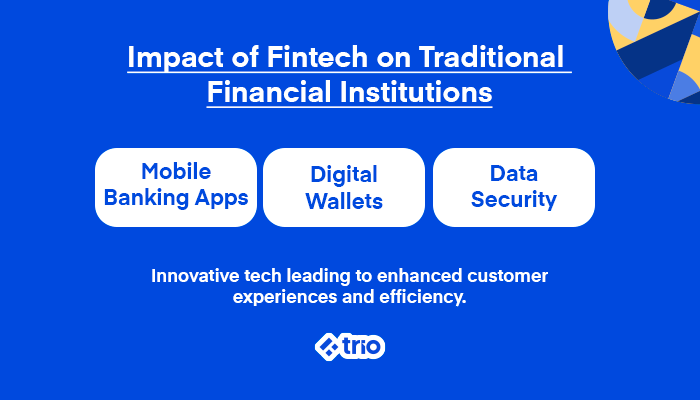Fintech is the future of finance. With the fintech industry now worth more than $209 billion, there is no denying that it is here to stay. The role of Fintech in the financial services industry ranges from lowering the barrier to entry for startups to increasing inclusivity in underserved populations and even changing the future of payments forever.
We’ve seen a rise in mobile-focused neobanks with no physical locations at all, blockchain-based platforms, and even AI integration. But even though Fintech shows incredible promise in the financial services industry, there are definitely some unique challenges regarding ever-shifting security and regulatory changes.
In order to ensure you are compliant, you need a fintech expert on your team. At Trio, we specialize in creating and integrating fintech products, whether web apps, mobile apps, or tools.
If you need a developer for your team, consider our staff augmentation hiring model, where you hire a developer only for the time you need, with no long-term commitment. Alternatively, we also offer outsourcing models.
But before you get to hiring, let’s make sure that you fully understand the role of Fintech in the financial services industry.
What is Fintech in Financial Services
Fintech, or financial technology, refers to companies using technology in the financial sector in order to make a task more efficient, or even completely take it over.
Internally, it usually involves some sort of automation, but more public-facing offerings include things like mobile payment systems and online lending platforms. In financial services, Fintech is usually a catalyst for change. It helps meet customer expectations in an ever-more-digital world and helps institutions keep up with their competitors.
How is Fintech Reshaping the Financial Services Industry?
There are many different ways that Fintech is reshaping the financial services industry. This includes effects on traditional financial institutions, customer expectations, and the general democratization of financial services.
Impact of Fintech on Traditional Financial Institutions
Traditional financial institutions and financial services companies are profoundly feeling the impact of fintech innovations.
Many of them are still burdened by legacy systems, while it is becoming increasingly obvious that these institutions must adopt new financial services technologies to remain relevant.
Mobile banking apps, digital wallets, and online lending platforms are leading this transformation, providing superior customer experiences and operational efficiencies.
Customers now expect seamless, 24/7 access to financial services, which Fintech delivers through intuitive digital interfaces in ways that many established financial organizations don’t.
By allowing third-party developers to access financial data securely via open APIs, open banking gives customers more control over their financial data, enabling them to access a wider range of personalized financial products and services.
By offering more transparency and being incredibly flexible, whether that’s in terms of hours that the services are available or the variety of services that are available, fintech companies are attracting younger clients, with Gen Z and Millennials making up their biggest user base.
The result is that traditional financial institutions are having to scramble to catch up and try to attract a younger user base. Many of them are integrating new features, partnering with fintech startups and scaleups who have created these platforms, such as real-time notifications, personalized dashboards, and even AI-powered tools.

Consumer Expectations and User-Centric Innovation
Fintech firms prioritize user-centric design, which, as we have just mentioned above, is setting new standards for customer experience.
Their intuitive apps and platforms allow users to manage their finances, make transactions, and access financial products with unprecedented ease and convenience.
Anyone using web and mobile apps today, regardless of the field they may fall into, expects smooth and personalized experiences. They want any technology to feel like it comes from a big tech company.
Their experience plays a big part in their perception of trustworthiness and the overall brand image, which is particularly critical when you are dealing with their personal data and finances.
This focus on user experience has compelled traditional banks and other financial institutions to revamp their digital offerings and adopt more customer-centric approaches. Fintech companies are able to do this. They have the resources and the experienced developers, and they have done their research.
Strategic Partnerships Between Banks and Fintechs
Collaboration between fintech companies and traditional financial institutions has also become increasingly common.
Unlike traditional banks, fintech firms operate with greater agility, enabling them to rapidly prototype, test, and launch innovative solutions.
This agility allows fintech companies to quickly adapt to changing market needs and customer preferences, driving a continuous cycle of innovation.
These partnerships allow traditional banks to leverage fintech expertise in areas like blockchain, AI, and data analytics without developing these capabilities in-house.
Joint ventures, API integrations, and white-label platforms are all allowing fintechs to work with banks and help them stay competitive, without necessarily having to redo all of their legacy infrastructure.
The hybrid solutions that are usually created end up combining the scale and compliance of the banks with the innovation and technical scalability of startups.
Democratization and Financial Inclusion
Fintech companies have democratized access to financial services, making them more inclusive and user-friendly.
These companies offer digital technology solutions that are not only faster and cheaper but also tailored to the specific needs of different customer segments.
This democratization empowers previously underserved and unbanked populations, contributing to global financial inclusion. One of the biggest examples of this is the rise of alternative credit scoring, which allows people who do not have a traditional credit history to get some sort of reliable credit score and make use of lending.
New business models such as peer-to-peer lending, robo-advisors, and crowdfunding platforms have emerged from fintech innovation.
All of this means that, if banks do not adapt, they may lose more individuals who are able to borrow, invest, manage their money, or take advantage of a variety of other financial services from more tech-forward companies.
Key Technologies Driving Financial Innovation
There are a variety of different technologies driving financial innovation, including AI, blockchain, and open banking technologies.
The Role of Artificial Intelligence in Financial Services
Artificial Intelligence (AI) is one of many new technologies revolutionizing financial services by enabling advanced analytics, personalized customer experiences, and enhanced fraud detection.
AI models can quickly analyze vast amounts of data to predict market trends, customer behavior, and potential risks, helping financial institutions make informed decisions in ways humans just can’t.
AI-driven chatbots and virtual assistants are also becoming increasingly popular. They provide personalized customer service, answering queries and offering financial advice based on individual user data.
Many companies are also starting to use AI algorithms to detect unusual patterns and anomalies in transactions, which helps with flagging potential fraudulent activities in real time.
The benefits of AI are vast for many financial institutions. However, implementing AI solutions requires expertise in data science and machine learning.
Trio can help you integrate AI technologies into your existing FinTech innovations or incorporate them into your new FinTech development projects, ensuring they are used effectively to enhance product offerings and operational efficiency.
Blockchain Technology Transforming Financial Transactions
Blockchain technology offers unparalleled transparency, security, and efficiency in financial transactions and has played a big role in decentralized finance.
Most people are familiar with it only as the underlying technology for cryptocurrencies like Bitcoin and Ethereum. It enables secure, decentralized digital transactions.
But that is not all it can do
Blockchain technology allows for smart contracts, which are self-executing contracts with the terms of the agreement directly written into code. This means that you can automate and enforce contract execution, reducing the need for intermediaries.
Blockchain can also be used to streamline supply chain finance by providing a transparent and immutable ledger of transactions, reducing fraud and improving trust. This is crucial for shaping the competitive landscape of finance.
If you are an emerging innovator, developing blockchain-based solutions can be complex. Trio’s developers, with expertise in blockchain development, can help ensure your fintech solutions are robust, secure, and scalable.
Open Banking and API Ecosystems
Open banking allows third-party developers and external companies to build applications and services around financial institutions, fostering a more competitive and innovative financial ecosystem.
Cloud services and APIs enable different systems to communicate and share data securely, allowing new fintech applications to access financial information.
Open banking is becoming more and more important as it gives customers more control over their financial data and digital assets, allowing them to share it with authorized third parties for better service offerings.
By providing access to financial data, open banking encourages the development of innovative products like budgeting tools, investment platforms, and lending services.
If you need assistance building dedicated teams of developers to take advantage of open banking, reach out to us here at Trio. Our experienced developers ensure compliance with regulatory standards and drive customer engagement.
Furthermore, with our focus on developer well-being and team culture alignment, you will retain top developer talent with ease throughout your FinTech app development.
Cloud Technology and Scalability
Cloud technology is enabling financial institutions to be more agile, scalable, and cost-efficient. In short, they provide everything needed to adapt and scale quickly, allowing companies to grow rapidly and take advantage of any emerging trends.
Cloud solutions can easily scale complex financial applications up or down based on demand, providing flexibility and cost efficiency.
Advanced security measures in cloud infrastructure protect sensitive financial data from breaches and cyberattacks, also making them the overall more trustworthy option, as these measures can be advertised.
Many people are still worried, though. It seems that even large institutions with extensive security occasionally experience data breaches.
Cloud technology enables rapid development and deployment of new applications and services. This lets you move through iteration and experimentation far faster than you may be able to otherwise.
By partnering with Trio, fintech startups can leverage cloud solutions to enhance their infrastructure, improve service delivery, and reduce costs. Experienced developers will also help you implement the best security measures.
Robotic Process Automation (RPA)
Robotic Process Automation (RPA) automates repetitive tasks such as data entry, compliance checks, and transaction processing, reducing human error and operational costs. It does this through the use of AI and machine learning, which are becoming very widely used.
Automated systems analyze customer data to offer personalized financial advice and product recommendations.
But how does it work?
In short, RPAs mimic human interactions with digital systems. This means that there are very few actual human interactions required, reducing the potential for mistakes like typos, increasing overall efficiency, and sometimes even supporting regulatory compliance.
Big Data Analytics and Decision-Making
Analytics and data play a crucial role in financial decision-making, providing insights that drive business strategies and operations.
Data is collected from various sources, such as customer transactions, market trends, and social media. Advanced algorithms and AI are used to analyze and interpret this data, identifying patterns and trends.
Through the use of real-time AI, this information can then be used to do everything from driving product recommendations to risk analysis.
Of course, AI analytics are not infallible, and there is always room for improvement, especially when it comes to qualitative values.
Insights from data analysis are then leveraged to make informed decisions, optimize operations, and predict future trends.
For fintech startups, Trio’s outsourcing services can help integrate advanced data analytics capabilities without any additional effort on your part, providing deeper insights and better decision-making tools.
Internet of Things in Finance
The Internet of Things (IoT) is poised to transform the finance industry by enabling real-time data collection and analysis.
IoT devices can collect data from various sources, providing real-time insights into customer behavior and financial trends.
Analyzing data from IoT devices can help predict market trends, customer needs, and potential risks. IoT devices can improve security by monitoring and detecting suspicious activities in real time.
If you are interested in FinTech innovations, integrating IoT solutions can open up new business models and revenue streams for you.
Trio’s dedicated teams can help develop and implement IoT solutions tailored to the financial sector, enhancing connectivity and data-driven decision-making.
New Fintech Business Models and Disruption
Let’s dive into some of the new business models that Fintech has made possible for those in the financial services industry.
Peer-to-Peer Lending
Peer-to-peer lending is an incredible fintech innovation that lets borrowers connect with lenders directly. P2P essentially cuts out all the middlemen, reducing the overhead and making lending more accessible in general.
Usually, P2P platforms make use of alternative credit scores and can offer faster approval times, lower interest rates, and generally good transparency, so they become very appealing to consumers and small businesses.
As you can imagine, this is creating a fair amount of pressure on traditional banks.
Robo-Advisors
Robo-advisors are AI-powered investment platforms that make use of algorithms to automate investments. These robo-advisors are used to build initial portfolios and manage them long term, and adjust based on changing user goals and risk tolerance.
Since a lot less human intervention is required, the costs associated with robo-advisors are often far less than the costs associated with traditional investing, which means it is incredibly accessible. Fintech firms are also making onboarding more seamless and providing intuitive dashboards that anyone can use.
Crowdfunding Platforms
Crowdfunding platforms are changing the way we pull money together, whether you’re a startup, need money for a creative project, or even have a community initiative of sorts.
Equity-based crowdfunding has been very popular as it introduces a new way to attract investors outside of venture capital and traditional finance.
Fintech has been a major driving force behind these platforms as they provide the infrastructure for secure payments, regulatory compliance, and even investor tracking.
Embedded Finance in E-Commerce
Embedded finance, as the name suggests, occurs when you embed or integrate a financial service into your platforms. This is great if you aren’t a finance company, as the finance product takes care of all the regulatory and compliance requirements and has the expertise to create a quality product.
The result is the best possible experience for your users, allowing them to pay, take out loans, or get insurance, without having to leave your platform.
Some of the most popular use cases of embedded finance include e-commerce, ride-sharing, and even entertainment apps.
Fintech Trends Shaping the Future of Financial Services
Fintech’s existence has been firmly cemented at this point. But instead of simply acting as a new product, some of these trends are shaping the future of financial services as a whole. Some of the most impactful trends we’ve noticed include real-time payments, personalization, RegTech, sustainability, and super apps.
Real-Time Payments
Gone are the days when you need to wait for payments to go through. Real-time payments are now becoming the norm, and if you cannot provide them, you are behind the times, whether you’re catering to consumers or providing B2B financial services.
Instant settlement systems, mobile-first infrastructure, and technologies like blockchain are behind these new capabilities.
Not only are they reducing processing delays, but they are also increasing transparency and overall customer satisfaction globally.
Personalized Banking Experiences
Since AI has become widely used, apps have started experimenting with personalization. Now, personalized banking experiences are also being utilized through machine learning to deliver tailored products and financial insights to users.
Large banks are starting to rethink what they are doing with their customer data, and whether there may be potential opportunities to offer better services to them.
Regulation and Compliance Tech (RegTech)
Regulatory technology is helping companies ensure compliance in a landscape that is changing very rapidly, allowing companies to focus their attention on other aspects of their product.
RegTech solutions generally use automation, machine learning, and real-time monitoring to help companies with identity verification, fraud detection, and transaction monitoring.
Ultimately, companies end up paying a lot less than they would have if they decided to take care of compliance themselves, and they minimize human error, all while being able to rest easy knowing that they are not only temporarily compliant, but the RegTech will be adjusted.
Sustainability in ESG in Fintech
Environmental, Social, and Governance (ESG) considerations are becoming more popular, especially since a lot of these new fintech trends are powered by AI, which requires a large amount of power for processing, as well as cooling.
Carbon footprints are a major consideration for investors and customers, and businesses are aligning with their values.
If you are a startup in the fintech space, this could be an opportunity to get ahead of your competitors by emphasizing your commitment to these considerations.
Super Apps
Super apps, or platforms that combine various financial aspects into one interface, are raising user expectations.
Banking, investing, payments, lending, and sometimes even insurance can all be accessed on the same platforms, with a smooth user experience. Users want ease and convenience, and these super apps are providing it.
There are a variety of different opportunities to enter the finance sector through Fintech, but you need to consider user requirements above all. If you provide what users want, you are more likely to be successful, regardless of the size of your company.
Trio can help guarantee your products work well by providing experienced developers with all the technical expertise you’ll need, who have used their skills on very similar projects before, and who are able to integrate seamlessly with any existing team members you have.
If you are interested in exploring our fintech developers or finding out if staff augmentation and outsourcing might be right for you, reach out to schedule a free consultation.
We do not provide one-size-fits-all solutions, but instead put together a custom plan based on your requirements.







